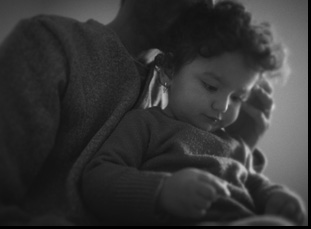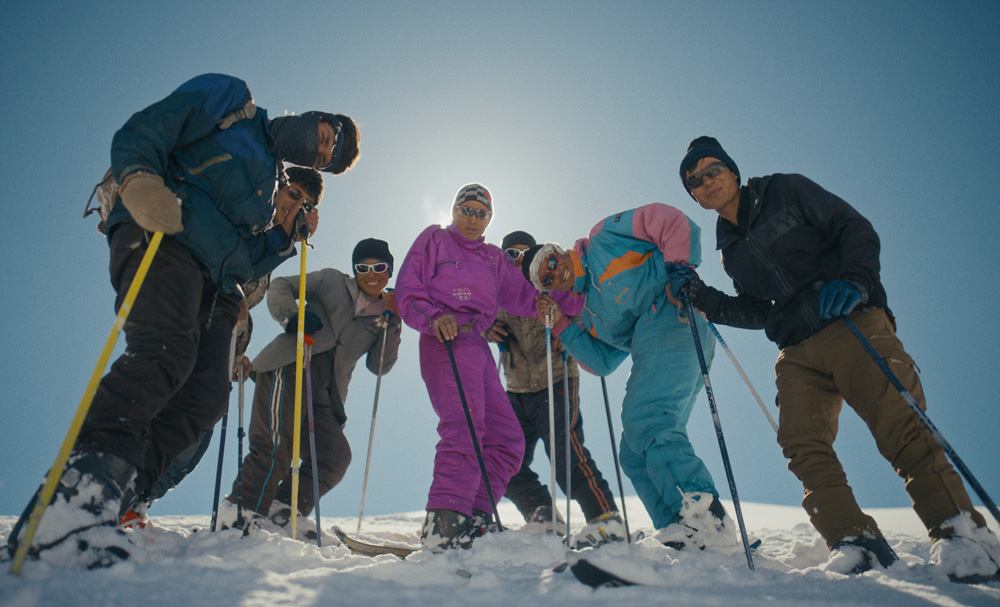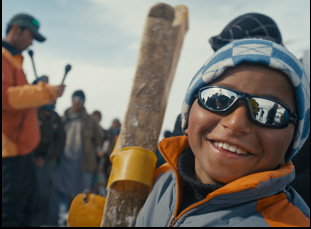As an accomplished cinematographer with a specialty for filming on the slopes, Ben Sturgulewski is used to navigating major curves, but he was really thrown for a loop when he had come back to the States after filming in Bamyan, Afghanistan where the mountains reach towards the sky and the snow caps have made it a haven for year-around skiing, culminating in a local cross-country competition. Filmed in 2019, Sturgulewski and his crew were putting the final touches on a feel-good short in the summer of 2021 when the country was on the verge of collapse after American troops had been withdrawn from the region and the Taliban was retaking control one town at a time.
“We wanted to make a film that was just pure joy and represented Afghanistan in a completely unexpected way,” says Sturgulewski, who had to radically rethink what would become his third feature “Champions of the Golden Valley.” “There was just so much joy and beauty in this community [we filmed in] and they felt wronged in a sense that they were always portrayed as a country of war, and they wanted to show the joyful side and empathetic side, so that’s what we wanted to do. And then after the collapse of Afghanistan, it was like, ‘Well, how can we possibly do that anymore?’”
In every respect, the heart of “Champions of the Golden Valley” remains what Sturgulewski originally filmed with the extraordinary event in Bamyan where locals would build their own wooden skis and makeshift ski lifts to take advantage of all that fresh snow, but it comes with the knowledge that as you watch all the time and effort that went into building a tradition, it vanished in an instant due to the reckless destruction of war when many of its participants were forced to flee abroad for their safety and those that stayed don’t dare challenge strict Taliban rule. The possibilities of what could be is reflected in the lighthearted rivalry between Mujtaba and Hussein Ali, who playfully arm wrestle when not competing against one another on the slopes, which is about the extent of any aggression between the two despite the fact they are from rival tribes. They have grown to be as respected in the community as their mentor Alishah, who started the Afghan Ski Challenge after training in Switzerland and bringing back what he knew to his homeland.
Even when Alishah is introduced in the present now residing in Germany, attempting to restart his life after having to leave everything behind, at the beginning of “Champions of the Golden Valley,” it becomes clear you don’t know the whole story as Sturgulewski takes audiences back to the Afghan highlands where you suspect even with what’s been erased, the memories of these precious peaceful times in which residents from all corners gathered to have fun are bound to last forever and perhaps inspire a different kind of revolution. While the film couldn’t have been easy to make on an emotional level when the director had to worry about his subjects’ safety after initial filming wrapped, Sturgulewski had to reconsider everything he had shot and the rousing result, recently making its premiere at Tribeca, is hopeful simply by existing, given all that it’s had to overcome to reach the screen. While in New York, the filmmaker spoke about what drew him to Bamyan in the first place, realizing there was a larger story than the one he initially set out to tell and what was gained in translation.
It’s had quite the evolution. Initially, I went to Afghanistan in 2019 and discovered this really amazing community in the ski race there, and we were going to make just a very small story about Afghanistan and this rivalry tale between Mujtaba and Hussein Ali, these teenager [skiiers], with Alishah [the ski instructor] as a supporting character. But after everything that happened in 2021 and Afghanistan collapsed, I was sitting there [thinking], “What are we going to do? Our story has fallen apart. Everything that we documented no longer [exists], so what’s the meaning behind what we had?”
I was going through interviews, and I found this interview that I had with Alishah [saying], “I could be one of those refugees living in America or Germany or anywhere else in the world, but I want to be here. I wanna be doing what I can for Afghanistan.” And in that moment, I realized that he had become that person that he did not want to be. He was living in Germany as a refugee against his own will and I had this moment of realization that despite their best efforts, they were building something beautiful, and despite everything that they were doing, they still had to give up. [It was a] tragedy of being so close, yet losing everything and it became clear that we should go find Alishah in Germany and see if he can update us on the story and try to find some meaning amidst the terrible things that happened in Afghanistan. Eventually, it turned into his story, and he became much more the focal point of the story.
Was it difficult to connect with him after all that time? I mean, after giving everything that happens?
It actually was amazing. We were very, very involved in the evacuation [of the region]. We, of course, had become friends and with our subjects and really connected with them in many ways, so during the time of the evacuation back in 2021, everyone who was making films and everyone who had an association with Afghanistan was doing everything that they could to really try to help get people out. We came out of a very, very difficult time of trying to assist in getting people out, including the women skiers from Bamyan, and immediately after, I actually went to a film festival in Italy and Alishah had just arrived there. He had just been evacuated and he had been in Italy for two weeks, so it was just incredibly fortuitous that I happened to be over there.
He was half an hour away, so I went and visited him and talked to him about what had happened and he was still very much in a state of shock, but we just got to reconnect after a few years of not having seen one another and as I dove back into the film, trying to figure out what to make of this, I was able to think back on some of the conversations he and I had in Italy. Then he moved to Germany, so I thought “Let’s go spend some time with him in Germany and see if we can’t get to the bottom of this new story that we’re unearthing.”
In its original intention, did the story around Mujtaba and Hussein Ali come to the fore pretty immediately in regards to this ski competition?
It really did. It’s a pretty famous ski race, and it no longer exists, but at the time, it was pretty renowned and after we’d heard about it, we knew that there was going to be some interesting story to wrap around it. I’m a mountain cinematographer, so I just got right into the mountains with these guys and we bonded very, very quickly, just having fun on the slopes and we were pointing our cameras at all the people, but it became clear very quickly that there were two guys who were the leaders of the pack and there was also this tension between them.
There’s this shot in the film where Mujtaba gets cut off by Hussein Ali and that was very much a real moment from the first day of shooting, and he did that very intentionally because he was thinking that Mujtaba was getting more of the camera time. We had no idea at the time who this Hussein Ali guy was, but visually, he’s just a very compelling subject in this purple suit. And that was before we’d even done any interviews. We sat down with Mujtaba and we were like, “Hey, who is this guy?” And he’s like, “Oh, that’s my rival.” From then on, it was like, “Okay, well, there’s a story here.”
What was it like to actually shoot on the mountains?
I’ve made ski movies for a very long time. I was born and raised in Alaska, so I’ve come from the mountains and it’s really where I feel comfortable. I’ve developed that skillset over the years and in that regard, I felt like the right guy to be able to figure out how to operate in the mountains in Afghanistan. But it was really cool because these mountains rise up behind the homes of the villagers in Bamyan, so they know them like the back of their hand and they made it really easy for us because they would put in the track up the mountain and we would generally just follow them where they went because they knew every nook and cranny and every turn. We were very much learning from them, and it was really an honor and a privilege to be shown their world like that and they were really excited to show us. They were so interested in our gear and our ski equipment in particular. We traded skis often just so they could try out our stuff and it was a lot of fun.

It was a great cultural exchange, and I’d say like mountain communities around the world have a way of communicating without language because we all have the same shared passion of winter and being in the mountains, so it was a delight to be able to connect in that way. Obviously, there’s some very different norms over there and we were told on day one, please don’t film the women in the village and that was hard [as a practical matter]. But when you’re on the ground, you just have to accept that. And then later on, as we started filming more of the women’s ski team, we were allowed to film them, so we were really grateful for that.
But actually there was one moment for that for me is a very formative moment in the film where there was a mullah speaking to a room full of school children. They’re all reading the Quran and it was a more progressive school in Afghanistan – there were boys and girls, everyone there and we were allowed to go in and film them. And everyone got quiet as the mullah started to speak and I didn’t know at the time what he was saying, but I was filming the faces of the children and I could tell what he was saying was warm and bringing the community together. It was a message of unity. And then later we asked the translator what he had been talking about, and [we were told] it was a message of “Hey, these guys are coming from a very far away place, but I want you to talk to them. I want you to be curious about them. I want you to learn about their culture and their beliefs and where they come from because it’s very important to get to know your neighbor.” And that was the message of the mullah to the children, and ultimately I think that’s also the message of our film. We want people to become curious about their neighbor and to have curiosity, tolerance and interest in people who might have other beliefs or be from other places than you are.
What’s it like getting to share with audiences now?
It’s quite thrilling. It’s been five years we’ve been making this film and we’re a small and very committed team and it’s taken so many twists and turns that it feels like stepping into the unknown. It’s been so insular, working on it with our core crew, and we’re ready to share with the world and it’s very much like setting your child free, sending them off to college, like we’ve done the best that we can do, and now we’ll see what kind of life it takes on for itself.
“Champions of the Golden Valley” will screen at the Tribeca Festival at Village East on June 9th at 2:30 pm, June 11th at 2:30 pm and June 16th at 2:45 pm.





